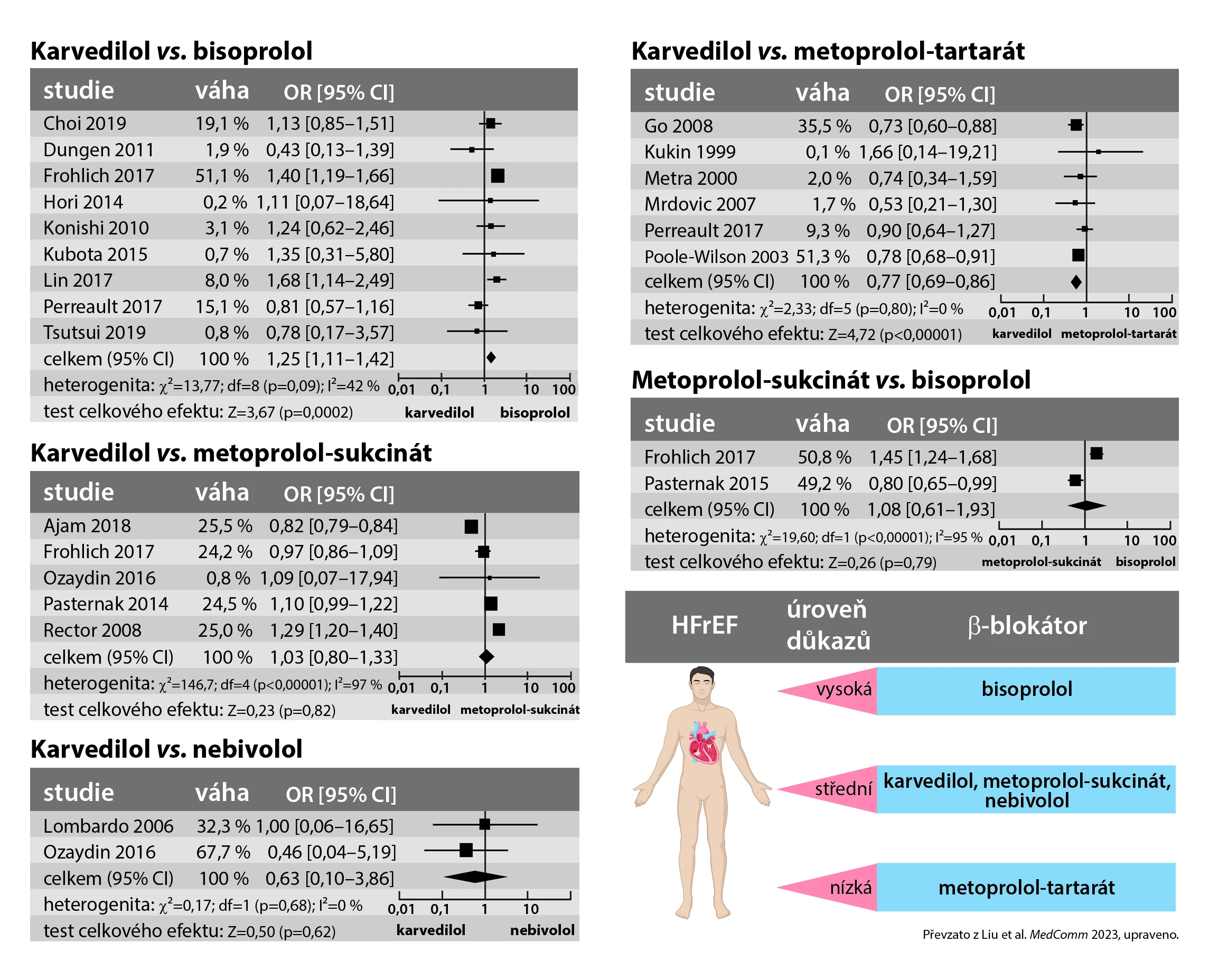-
News
- Technology /AI
- Medical journals
- Topics
Comparison of 5 Beta-Blockers in Heart Failure with Reduced Ejection Fraction
24. 4. 2024
An analysis of 26 studies with beta-blockers in the treatment of heart failure with reduced ejection fraction compared 5 drugs (bisoprolol, metoprolol-succinate, metoprolol-tartrate, carvedilol, and nebivolol). The results showed a more favorable prognosis with bisoprolol compared to carvedilol, a similar effect on prognosis for carvedilol, metoprolol-succinate, and nebivolol, and the least favorable prognosis with metoprolol-tartrate.
Introduction
In chronic heart failure with reduced left ventricular ejection fraction (HFrEF), one of the basic recommended therapeutic measures is to initiate a very low dose of a beta-blocker (BB) and to titrate it to the highest tolerated dose. However, direct comparisons between BBs in this indication are lacking. A combined analysis of randomized controlled trials and observational evaluations comparing the safety and efficacy of individual BBs published in 2023 provides some guidance for selecting the optimal drug for patients with HFrEF. The multi-faceted analysis included 26 studies, 14 randomized controlled, and 12 observational. Their methodological quality was generally good.
Results
Bisoprolol vs. Carvedilol
Compared to carvedilol, bisoprolol reduced overall mortality (odds ratio [OR] 1.25; 95% confidence interval [CI] 1.11–1.42; p = 0.0002) and increased left ventricular ejection fraction (LVEF) (p < 0.00001). The effects of bisoprolol and carvedilol on the risk of rehospitalization for heart failure (HF), reduction in heart rate, and length of hospitalization were comparable. The occurrence of adverse events, including worsening of heart failure and hypotension, was similar. Carvedilol induced bradycardia less frequently than bisoprolol (OR 0.60; 95% CI 0.41–0.89; p = 0.01). Therefore, according to this analysis, bisoprolol has greater benefits and comparable safety to carvedilol in the treatment of HFrEF.
Carvedilol vs. Metoprolol-Succinate
No significant differences in terms of overall mortality, recurrent hospitalizations for HF, or change in LVEF were found between the carvedilol and metoprolol-succinate groups. Therefore, the benefits of carvedilol and metoprolol-succinate are comparable in patients with HFrEF according to the presented evidence.
Carvedilol vs. Metoprolol-Tartrate
Compared to metoprolol-tartrate, carvedilol reduced overall mortality (OR 0.77; 95% CI 0.69–0.86; p < 0.00001), increased LVEF (p < 0.0001), and reduced the risk of worsening HF (OR 0.41; 95% CI 0.18–0.98; p = 0.04), but did not reduce the risk of rehospitalization for HF. Comparable results were achieved with both drugs in terms of the 6-minute walk test (6MWD), change in heart rate, and quality of life score according to the Minnesota Living with Heart Failure Questionnaire. The incidence of adverse events and treatment discontinuation was similar. It can thus be summarized that carvedilol offers greater benefits and comparable safety to metoprolol-tartrate in the treatment of HFrEF.
Carvedilol vs. Nebivolol
No significant differences were observed between carvedilol and nebivolol in terms of overall mortality, rehospitalization due to HF, or treatment-related adverse events in patients with HFrEF. Therefore, both active substances can be considered comparable in this indication.
Bisoprolol vs. Metoprolol-Succinate
The reduction in overall mortality with these drugs was comparable, whereas the risk of rehospitalization for HF was significantly lower with bisoprolol than with metoprolol-succinate (OR 1.29; 95% CI 1.03–1.63; p = 0.03). Thus, bisoprolol shows superiority in the treatment of HFrEF compared to metoprolol-succinate.
Fig. Summary of multi-sided comparison of the impact of individual BBs on overall mortality in patients with HFrEF

Conclusion
The authors of this indirect comparison concluded that bisoprolol is significantly more effective than other beta-blockers in patients with HFrEF. They found a similar benefit for carvedilol, metoprolol-succinate, and nebivolol. The effect of metoprolol-tartrate was smaller than that of the other evaluated BBs. The incidence of adverse events was comparable for all active substances. However, direct comparative studies are needed for definitive conclusions on the comparison of the efficacy of the individual blockers.
(zza)
Source: Liu B., Zhang R., Zhang A. et al. Effectiveness and safety of four different beta-blockers in patients with chronic heart failure. MedComm 2023; 4 (1): e199, doi: 10.1002/mco2.199.
Did you like this article? Would you like to comment on it? Write to us. We are interested in your opinion. We will not publish it, but we will gladly answer you.
Labels
Diabetology Internal medicine Cardiology General practitioner for adults
Login#ADS_BOTTOM_SCRIPTS#Forgotten passwordEnter the email address that you registered with. We will send you instructions on how to set a new password.
- Technology /AI
